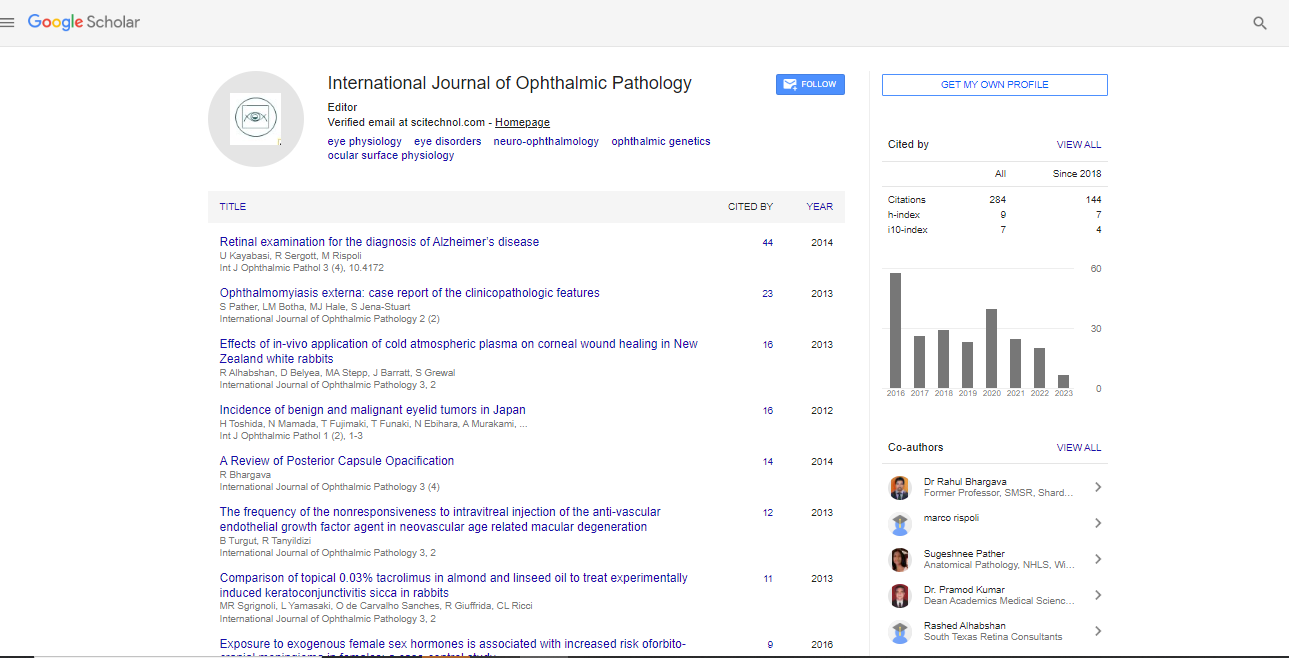Intravitreal anti-VEGF monotherapy in retinopathy of prematurity management, a case series of our first 10 eyes
Rachid Chigara, A Haddad, Y Ouldbouamama, I N Taibi and O Ouhadj
Mustapha university hospital, Algeria
: Int J Ophthalmic Pathol
Abstract
Purpose: The purpose is to study the structural outcome of intravitreal injections of Ranibizumab in zone 2 stage 3 ROP. Setting: CHU-Mustapha Pacha Alger, Service d’Ophtalmologie, chef du service Pr O. Ouhadj. Premature infants born in CHU-Mustapha maternity hospital, who met our main screening criteria, (Infants born before 30weeks gestational age and/or weighing less than 1500g at birth and/or required any sort of ventilation assistance and oxygen therapy) were automatically sent for screening following discharge. All screenings were carried out using a Retcam 3, after pupil dilation, using both tropicamide and phenylephrine, on awaking infants. Stage 3, zone 2 ROP were treated in the operating theatre under strict aseptic conditions with a single injection of 0.20mg Ranibizumab. Follow up exams were also carried out using a Retcam 3, after pupil dilation, on awake infants, 48 hours, days 7, 14, 21, and 28 as well as every second week for 3 months and every month for six months or until completion of retinal vascularisation.
Results: Regression was seen in 8 eyes treated by a single intravitreal injection of 0.20mg Ranibizumab, with signs of regression as early as 48 hours subsequent to treatment, which was shortly followed by visible progression of apparently normal retinal vasculature beyond the former limit between vascularised and non-vascularised Retina. 1 eye was injected twice and one eye evolved showed progression of the disease to stage 4a.
Conclusions: Screening and treatment of retinopathy of prematurity at its early stages is primordial in ROP management. Intravitreal injections of anti- VEGF agents aren’t widely used in the treatment of ROP and seem to be safe and effective in the short term, however questions remain unanswered about the long-term safety and effectiveness of such treatments. Structural outcome 4 weeks after intravitreal Ranibizumab 0.2mg; note regression of neovascularization, flattening of the fibrovascular ridge and progression of normal vasculature.
Biography
Rachid Chigara is an ophthalmology trainee at Mustapha University Hospital in Algiers. In his final year he has developed an interest in pediatric ophthalmology and currently works in the retinoblastoma unit at the same hospital, where conservative treatment of retinoblastoma is performed. After the Algerian Society of Ophthalmology’s 31st congress in 2016, whose main theme was ROP. He helped in retinopathy of prematurity screening and the treatment of certain cases using Anti-VEGF agents under the guidance of the Head of the ophthalmology department Pr O.Ourida. Rachid is also interested in pursuing a career in research and developing blindness prevention programs in Africa as well as university teaching and international conferences.
E-mail: rachid.chigara@gmail.com
 Spanish
Spanish  Chinese
Chinese  Russian
Russian  German
German  French
French  Japanese
Japanese  Portuguese
Portuguese  Hindi
Hindi 